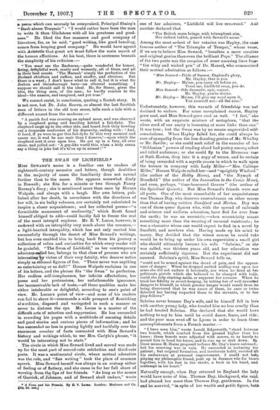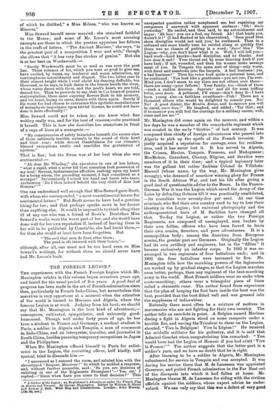THE SWAN OF LICHFIELD.* Miss SEWARD'S name is a familiar
one to readers of eighteenth-century memoirs and letters, though doubtless in the. majority of cases the familiarity does not extend further than to the name. She appears somewhat dimly in Boswell ; she flits for a minute or two through Fanny , Burney's diary; she is mentioned more than once by Horace Walpole, and always with a laugh. Her own letters, pub- : lished after her death, in accordance with the directions of her will, in six bulky voluMes, are certainly not calculated to inspire a closer acquaintance; and her collected poems—" a formidable monument of mediocrity," which Scott found himself obliged to edit—could hardly fail to freeze the zeal of the most intrepid explorer. Mr. E. Y. Lucas, however, is , endowed with an intrepidity very much above the common,— a light-hearted intrepidity, which has not only carried him successftilly through the -desert of Miss Seward's writings, but has even enabled him to bring back from his journey a collection of relics and curiosities for which every reader will be grateful. "The Swan of. Lichfield," as her contemporary
admire led her, belongs to that class of persons who are I ,
interestiak virtue of their very fatuity, who deserve notice simply as. eb ? ossal figures of fun. "There never was anything so entertaining or so dull!" Horace Walpole exelaims in one of his letters, and the phrase fits " the Swan " to perfection. Her endless self-complacence, her infinite affectations, her poses an her . pretensions, her unfathomable ignorance, her inconceivable lack of taste,—all these qualities make her either intelerable or delightful, according to. one's point of view. Mr. Lucas's point of view—and none of his readers can fail to share it—commands a wide prospect of flourishing alsardities, • disposed and variegated iu such a manner as never to distress the eye. Mr. Lucas is a master of the difficult arts of selection and suppression. He has succeeded in crowding his pages with a multitude of- amusing details and good stories and curious pieces of information ; and he
• has succeeded no less in passing lightly and tactfully over the enormous number of facts connected with Miss Seward's history and writings- which, to use Mrs. Carlyle's phrase, " it would be interesting not to state."
The circle in which Miss Seward lived and moved was made np for the most part of second-rate celebrities and third-rate . poets. It was a sentimental circle, where mutual adoration was therule, and "fine writing" took the place of common speech. Miss Seward herself was always in an ecstasy either of feeling or of flattery, and she came in for her full share of worship fromtlig lips of her friends. "As long as the names of Garrick, of Johnson, and of Seward shall endure," wrote A Sloan, and dry *trade'. By E. V. incise. London: Methuen and Co.
LIZ % id. • .
one of her admirers, " Lichfield will live renowned." Add another declared that "The British muse brings, with triumphant aim, Her richest tablet, graced with Seward's name."
Among the most ardent of her votaries was Hayley, the once famous author of "The Triumphs of Temper,". whose verse, if we are to believe Miss Seward, " breathes a more creative and original genius than even the brilliant Pope." The alliance of the two poets wit.s the occasion of some amusing lines hop) " the witty and wicked pen" of Dr. 3,1ansel, who summarised
their mutual admiration as follows :—. •
"Miss Seward—Pride of Sussex, England'a, glory, Mr. Hayley, that is you.
Mr. Hayley— Ma'am, you carry all before ye, Trust me, Lichfield swan, you do. Miss Seward—Ode dramatic, epic, sonnet,
Mr. Bayley, you're divine.
Mr. Hayley— Ma'am, P11 give my word upon it, You yourself are—all the nine."
Unfortunately, however, this warmth of friendship was: not destined to endure. For some unexplained reason, Hayley grew cool, and Mists Seward grew cool as "well. " I feel,"ehe wrote, with an exquisite mixture of metaphors, " that the silver cord of our, amity is loosening at more links than due:" It was true ; but the Swan was by no means unprovided svith consolations. When Hayley failed her, she could always be sure of sympathy from the less dazzling genius of Mr. Whalley or Mr. Saville ; or she could seek relief in the exercise of- her " Siddonian " powers of reading aloud bad poetry among select and titled audiences ; or she could fly to the Etruscan .vase at Bath-Easton, drop into it a copy of verses, and be certain of being rewarded with a myrtle crown in which to walk upon the terrace in company with Lady Miller—" Mrs. Calliope
Miller," Horace Walpole called her—and " sprightly Winford " (the author of the Hobby Horse), and " the Nymph of Dronfield " (the author of the Invocation to the Comic Muse), and even, perhaps, "time-honoured Graves" (the author of the Spiritual Quixote). But Miss Seward's friends were mot all poets. One of the most remarkable of her acquaintances was Thomas Day, who deserves remembrance on other scores than that of having written Sandford and Merton. Day was one of those queer figures who, with the .spread of railroads and science and uniform education, have fled for ever from the earth ; he was an eccentric,-when eccentricity meant something more than the wearing of unusual waistcoats ; he
was a character whom one would expect to find in a novel by Smollett, and nowhere else. Having made up his mind-- to marry, Day decided that the wisest course he could take would he to bring up under his own supervision a small girl who should ultimately become his wife. "Sabrina,'-' as .she was called, was thirteen years old, and her education was certainly sufficiently rigorous. But the experiment did not succeed. Sabrina's spirit, Miss Seward tells us,
"could not be armed against the dread of pain, and the appear- ance of danger.' When ho dropped melted sealin,r-wax upan her arms she did not endure it heroically, nor when 'be. fired, at. her petticoats pistols which she believed to be charged with balls, could she help starting aside, or suppress her screams. When ho tried her fidelity in secret-keeping, by telling her of well-invented dangers to himself, in which greater danger would result from its being discovered that he was aware of them, ho once or twice detected her having imparted them to the servants, or to her play-fellows." - Sabrina never became Day's wife, and be himself fell in lei° with another young lady, who treated him no less cruelly than
he bad treated Sabrina. She declared that she would have nothing to say to Min until he could dance, fence, and ride ; and the poor man went off to Lyons in order to learn these accomplishments from a French master :—
"I have seen hini," wrote Lovell Edgeworth, stand between two boards, which reached from the ground higher than his knees : these boards were adjusted with screws, so as barely to permit him to bend his knees, and to rise up or sink down. By these means.M.-Huise proposed to force Mr. Day's knees outward ; but his screwing was in vain. lie succeeded in torturing his patient ; but original formation, and inveterate habit; resisted all his endeavours at personal Improvement. I' could' not help pitying my philosophic friend, pent up in durance vile for hours together, with his feet in the stocks, a book in his hand, and contempt in his heart."
Naturally enough, when Day .returned to England the lady
would have none of him.._Thomas Day, 'blank.guard,_she said, had pleased her more than Thomas Day,- gentleman. In the end he. married, "in spite of her wealth and petite figure, bah
of which be disliked," a Miss Milnes, " who was known as Minerva."
Miss Seward herself never married : she remained faithful to the Muses ; and some of Mr. Lucas's most amusing excerpts are those in which the poetess appraises her fellows
in the craft of letters. "The Ancient Mariner," she says, "is the greatest quiz of a composition I ever• met with," though
she allows that " it has very fine strokes of genius." But she is at her best on Wordsworth :—
" Surely Wordsworth must be as mad as was ever the poet Lee. Those volumes of his, which you were so good to give me, have excited, by turns, my tenderest and warm admiration, my contemptuous astonishment and disgust. The two latter rose to their utmost height while I read about his dancing daffodils, ten thousand, as he says, in high dance in the breeze beside the river, whose waves dance with them, and the poet's heart, we are told, danced too. Then he proceeds to say, that in ne hours of pensive contemplation, these same capering flowers flash in his memory, and his heart, losing its cares, dances with them again. Surely if his worst foe had chosen to caricature this egotistic manufacturer of metaphysic importance upon trivial themes, he could not have done it more effectually !"
Miss Seward could not be taken in; she knew what fine writing really was, and for the best of reasons,—she practised it herself. This is bow she describes her sensations in front of a cage of lions at a menagerie :— " My consciousness of safety luxuriates beneath the secure view of these sublimely terrible animals, in the sound of their howl and their roar ; while devout thankfulness for our climate's blessed exemptions exalts and sanctifies the gratulation of egotism."
That is fine; but the Swan was at her best when she was sentimental :— " Ah dear Mr. Whalley," she ejaculates in one of her letters, "what a rapid, what a never till then sensation took possession of my soul ! fervent, instantaneous affection rushing upon my heart for a being whom, the preceding moment, I had considered as a stranger! Involuntarily I seized his hand and burst into tears, exclaiming Do I then indeed behold the very child of dear lost Honora ? ' " •
One can understand well enough that Miss Seward gave Scott, with whom she corresponded, " a most unsentimental horror for sentimental letters." But Scott seems to have had a genuine liking for her; and that perhaps speaks more in her favour than anything else. It would be impossible to think altogether ill of any one who was a friend of Scott's. Doubtless Miss Seward's works were the worst part of her, and she would have done well for her own reputation if, instead of leaving them in her will to be published by Constable, she had burnt them,— for then she would at least have been forgotten. But
"The evil that men do lives after them;
The good is oft interred with their bones,"—
although, after all, one must not be too bard even on Miss Seward's writings, for without them we should never have had Mr. Lucas's book.











































































 Previous page
Previous page